Products are chosen independently by our editors. Purchases made through our links may earn us a commission.
We are living in anxiety-inducing times. After several years of being stuck in a pandemic and social isolation, even the most laid-back of us are probably finding ourselves wanting to breathe deep into a paper bag. Throw all the added stressors of being a teenager to the mix and your teen may be looking for support.
If you have a teen that is showing signs of stress and a need for coping skills, there are plenty of mindfulness and therapy apps that can help give them a boost to get through tough times.
While no app will ever replace the expertise and guidance of a mental health professional, here are some highly rated apps that we thoroughly tested and evaluated based on usability, accessibility, and appropriateness for teens. These apps can help teens develop and sustain coping habits for any time anxiety rears its ugly head, and they can help give a supportive boost to tackle stress with skills that will last them a lifetime.
1. MindShift
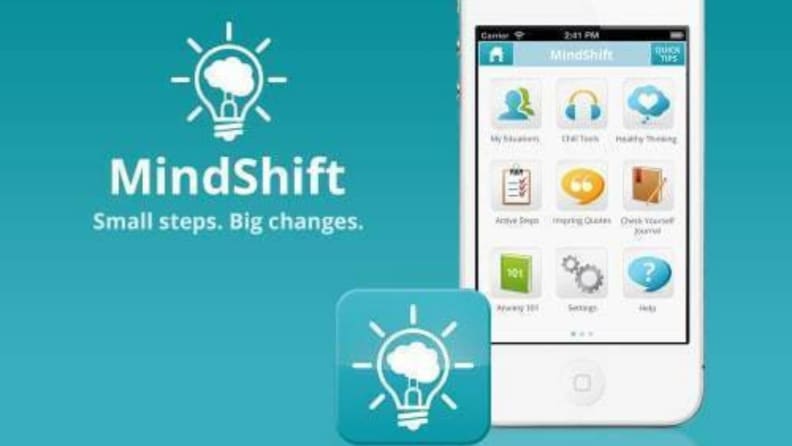
MindShift is a mindfulness app that is specifically designed for teens and young adults that struggle with anxious thoughts.
Best for ages: 12 and older Cost: Free with no in-app purchases
MindShift is a mental health app that is specifically designed for teens and young adults that struggle with anxious thoughts. It helps hone in on the anxiety the user is feeling and gives them tools to manage that anxiety, such as healthy thinking, finding their “chill zone,” and giving positive action items.
One of the things that makes anxiety so pervasive is the lack of control that occurs when it creeps in. We like that this app focuses on empowerment: It helps to decode anxiety through their “learn” options and also helps the user set specific and realistic goals. One reviewer called this a “cheerleader in your pocket;” we love that definition as it encourages the user to take charge and helps to take the fear out of riding out intense emotions.
2. 7 Cups

This app has personal listeners available especially for teens to chat confidentially whenever they need to.
Best for ages: 13 to 17 (with an adult option for older teens) Cost: 7 Cups offers plenty of free content including message boards and an active listener. To connect with a licensed therapist, it costs $12.99 a month, $94.99 a year, or $399.99 for a lifetime of premium access.
Anxiety can feel lonely, isolating, and unsettling. If your child feels like they are “weird” or that no one can relate to what they are going through, this app provides an anonymous way to find support and access coping tools. What sets 7 Cups apart is that it’s community and connection-based at its core, while stopping short of being actual therapy (at least in the free version).
It’s also completely anonymous, which can feel freeing for a teen struggling with how to define, accept, and talk about what they are feeling. The app offers community groups where users can ask questions, get support from peers, and make friends who can relate to what they are going through.
For users who want a more focused experience, they can also sign up for a 1:1 chat with a dedicated, volunteer "active listener." A paid service will connect users with a trained therapist; the free service, on the other hand, connects users with a trained volunteer who can offer “compassion but not advice.” The service clearly states that the active listener is not meant to be a therapist, but more of an empathetic and anonymous ear meant as a safe haven of support. The app does provide the “active listeners” with a training program on sensitive subjects so they are empathetic to typical teen struggles and know when to advise more in-depth help.
3. BoosterBuddy
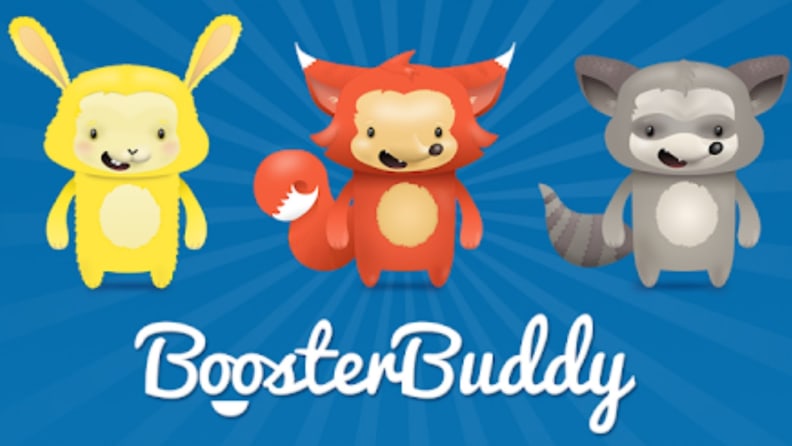
Booster Buddy gives reminders described as “daily quests” for healthy habits.
Best for ages: 12 and older Cost: Free with no in-app purchases
Anxiety can make you feel like you are spiraling out of control. BoosterBuddy gives reminders described as “daily quests” to help users build positive mental health habits.
This app was created to suggest coping skills for Obsessive Compulsive Disorder, disordered eating habits, and self harm. While that may not be what your child is specifically working on, anxiety frequently turns into obsessive thoughts as a way for the sufferer to manage through their stressors.
This app can help them get on a more healthy and empowered track. This is about approaching the beast in small, manageable increments and teaching self care through prompts and exercises, and it also offers a coping library to help users through particularly rough patches.
4. Simple Habit
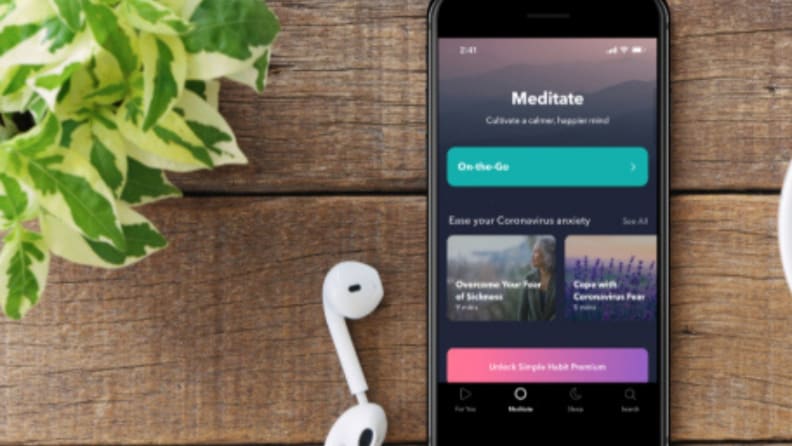
Simple Habit is a fast path to self care for the teen with little time or attention to spare.
Best for ages: 12 and older Cost: The app is free to download, and offers plenty of free content. Access to additional premium-level meditations costs $11.99 a month, $89.99 a year, or $299.99 for a lifetime.
There are so many meditation and mindfulness apps out there, but after testing a handful of the best-known, this one really stood out to us. Simple Habit is made for the teen that’s feeling stressed but either can’t devote time to self care or doesn’t know how to.
The developers of this app took note that one of the biggest obstacles for teens is that they feel overwhelmed at the prospect of meditation, that they don’t know how to meditate, or they feel like they don’t have the time to fit mindfulness practices into their lives. This app takes all of those hurdles into consideration and creates tailored programs, where a little bit of mindfulness goes a long way.
Simple Habit helps hone in on particular needs and creates a tailor-made plan for the user. Super-specific meditations focus on common stressors, including very timely ones like easing coronavirus anxiety, how to wash your hands mindfully, and how to turn fear into calm. The meditations are short and sweet and non-judgmental. Some other apps come with a feeling of where you need to be in your mindfulness practice, while this one really meets the user where they’re at.
5. Rootd
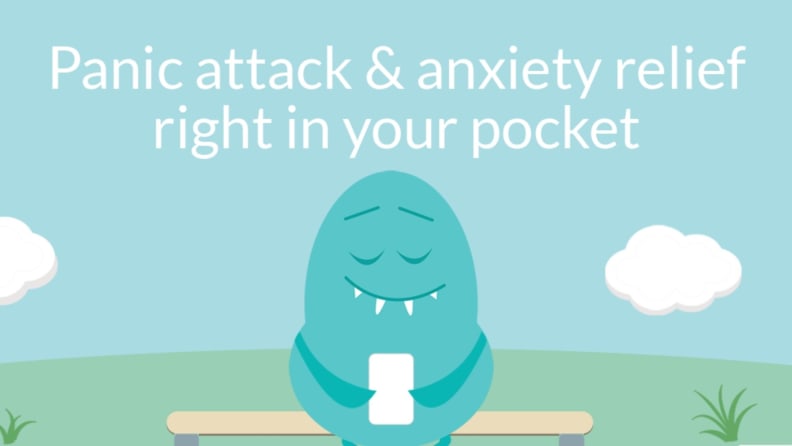
Rootd is like having a actual panic button in your pocket.
Best for ages: 12 and older Cost: The app is free to download, and offers plenty of free content. Full access subscriptions cost $6.99 a month, $59.99 a year, or $139.99 for a lifetime.
Rootd is like having a panic button in your pocket—literally. This app’s main feature is a big, red panic button that users hit when they feel a panic attack flood in. Depending on different levels of panic, Rootd takes users through Cognitive Behavioral Therapy (CBT) techniques to help retrain the mind into positive behavioral strategies for coping. While it can take a few tries to feel empowered, Rootd talks users through a guided approach to regaining control when anxiety strikes.
This app also offers a deep-breathing tool, an anxiety journal, guided visualizations and body scans, a stats page, and empowering lessons. Taking a “knowledge is power approach” to wellness, the app also provides reading material to demystify panic and anxiety. The app also calls out major stressors for girls, including social media anxiety and anxiety that might be associated with PMS.
6. Acupressure: Heal Yourself

Finding anxiety release points can be a powerful tool against anxiety.
Best for ages: 12 and older Cost: This app costs $1.99 for all content. There aren't any additional in-app purchases.
Sometimes breathing and visualizing aren't enough. Acupressure is a natural healing strategy where you target specific areas of the body in order to alleviate pain or stress by increasing blood flow. We like that this app focuses more on the physicality of calm than the mental aspect.
When you’re experiencing stress sometimes analyzing thought patters can make you feel even more anxious and sometimes—like when you're sitting at a desk in a classroom of other students—mindfulness breathing might not be practical. This app guides users on what pressure points to use in order to help pull focus away from emotions—which, in turn, can help teens find a new way to recenter, relax, and concentrate. This isn’t the most visually appealing app, but the idea behind it and the execution are great.
7. Moodtrack
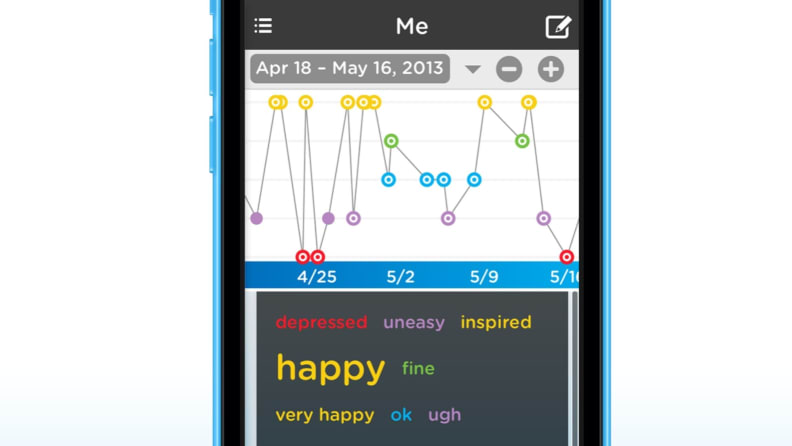
Moodtrack is like a bullet journal for moods, helping teens to identify patterns in their anxiety and stress.
Best for ages: 12 and older Cost: Free to download and use, however there is a one-time fee of 99 cents for full anonymity.
Whether your kid suffers from clinical anxiety or they are just dealing with the typical mood swings of a suffering teenager, Moodtrack is an awesome app to help them track their moods. This app works essentially like a bullet journal for mood swings where users can enter, rate, and comment on their feelings to refer back to.
Moodtrack helps to identify moods and track them in colorful graphs over days, weeks, months or years, giving broad insight into emotions and feelings as well as the triggers of anxiety and stress. This is a great tool because it helps users identify tendencies early on, like stress before mid-terms, moodiness before a menstrual cycle, and feelings of melancholy before the holidays. By being able to track tendencies, users can work to break negative cycles and habits.
The free version of this has a bit of a social network component where other users can search and follow by username. This can be helpful when trying to build a community and when, for example, a therapist or a parent wants to keep track of a teen’s moods. We can, however, easily see where this might go south—particularly when a community mostly consists of other teens. For a nominal, one-time fee of 99 cents, a user can track their moods with full privacy; for less than a dollar we recommend springing for the extra privacy.
8. Smiling Mind
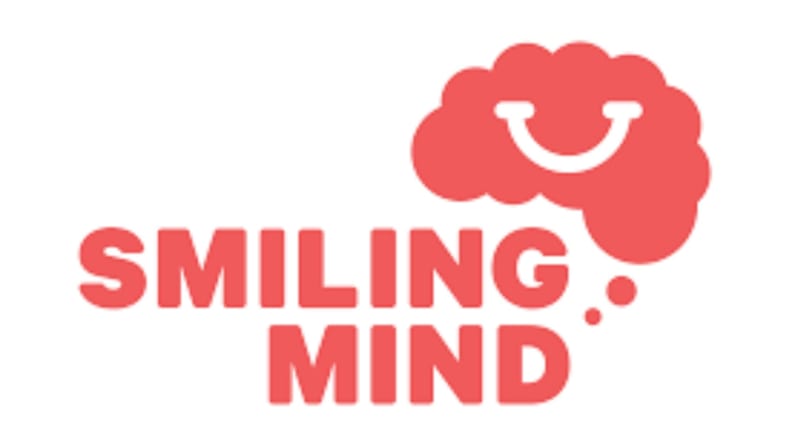
Smiling Mind is a mindfulness and meditation app and self-care toolkit all in one, with directed content made just for teens.
Best for ages: 7 to 18 Cost: Totally free with no in-app purchases.
Smiling Mind is a mindfulness and meditation app, but it also acts as a self-care toolkit. When you first sign in, Smiling Mind asks for users to register with an age preference. Each age group is given a set of guided meditations designed to bring users from a beginning level to a “mindful master” level over time.
A lot of mindfulness apps that profess to work for “all ages” leave teens out of the equation, only allowing them to choose if they fit into categories intended for either young children or adults—giving them content that is either too childish or unrelatable, without really addressing the unique stressors teens experience.
Smiling Mind not only recognizes the needs of teens, it breaks teens into an older and younger categories, recognizing that adolescents just entering middle or high school are experiencing different anxieties than those applying for college or jobs. The teen self-care content on this app really pays attention to what adolescents are thinking and feeling, what they want to hear, and how they need to hear it.
For teens, this app gives focus on better understanding stress and how to care for yourself, not only with guided meditations and body scans, but with short and relatable videos that somehow manage to strike the perfect balance of positive and fun yet also cool, informative, and direct.
There’s an entire section of the self-care toolkit that consists of short videos that dive into common stressors and help to not only validate the feelings of teens but also identify counter-productive tendencies with upbeat hosts and funky graphics. We really like this one as an intro to self-care overall and recommend it in tandem with any other apps you might try.


